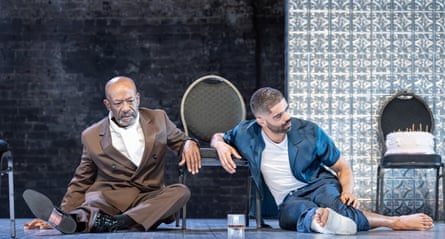‘A family crisis brings out the best and the worst in every member of it,” reflects a character in Tennessee Williams’ explosive 1955 drama about mendacity and marital love. This family, headed by a dying cotton-plant magnate in the Mississippi delta, certainly know how to gouge bits out of each other in their moment of crisis.
It opens with marital malaise and follows up with family implosion. The former manifests as a chill between alcoholic ex-football star Brick and his wife, Maggie.
Rebecca Frecknall’s last production of a Williams play starred Paul Mescal. Now, Daisy Edgar-Jones, his co-star from the hit TV series Normal People, takes to the stage. She is a convincingly catlike Maggie, but she is not a pleading seductress. She works hard to poke Brick for a reaction, becoming increasingly enraged by his aggressive silences, speaking of her sex appeal rather than using it as her currency, as was the case in Benedict Andrews’ bare-fleshed 2017 production starring Sienna Miller and Jack O’Connell.
She tries to stir a reaction in Brick by mentioning his late best friend, Skipper, with insinuations that he killed himself because he harboured a homosexual love for Brick. The suggestion is that Maggie could never compete. Maybe this is why Edgar-Jones plays her with such angry energy – but it makes her character untextured and invulnerable, the first act feeling too long, loud and not intimate enough.
Williams, in his instructions, spoke of a double bed on stage. In its place here is a piano, stylish in itself and sounding notes intermittently. For a while it seems like a visual pun (are Brick and Maggie playing each other?), and eventually it gains some significance. But the removal of the bed leaches the sexual elements of desire, need and revulsion out of the first act, while the piano-playing feels redundant and mannered.

Frecknall’s production is full of stylishness as a whole but it does not plumb the emotional depths at the core of the play. It does switch gears in the second act, though, with the family’s face-offs over the terminal diagnosis of its alpha-patriarch, Big Daddy (who is the last to know he is dying), and the ensuing tussle for his inheritance.
Lennie James’s Big Daddy is physically unimposing but he makes a larger-than-life tyrant, lusting for life even in the face of death. As a cotton plantation owner and former overseer, his casting brings an interesting racial inversion. His anger brings less volume but more potency, too.
What is also felt powerfully is Kingsley Ben-Adir’s acute portrait of addiction in Brick. His alcoholism is openly acknowledged, and painfully witnessed, by the family. Ben-Adir plays a convincing and vulnerable drunk, yet still looks like the athlete and football player he once was.
Chloe Lamford’s set design is bare except for the piano and a few chairs, with metallic walls that suggest the wealth of this family but also the prison-like “cage” that Maggie speaks of occupying with Brick.
It is a merciless study of how a family expresses love as hate, but it is the men in this play who seem to do the hating. Both Big Daddy and Brick show open revulsion for their wives, who are long-suffering yet determined to hold on, Big Mama is even content to “love” her husband’s “hate and hardness”. It is a peculiarly unpleasant picture of female desire and its sublimation.
Clare Burt plays Big Mama with integrity nonetheless. Maggie and her ever-fertile sister-in-law, Mae (Pearl Chanda), swap brilliantly catty barbs with the fixed smiles of rivals, and the screaming hijinks of the three children (reduced from Williams’ original five) are more effective than the manufactured melodrama of the piano.
And although Williams stated that the play should have two intermissions, the second pause here, which leads into the final act, drains the drama that has built up previously, so it seems to end on a minor note. Ultimately, this is a production that you admire rather than one that moves you.

.png) 3 months ago
33
3 months ago
33













































